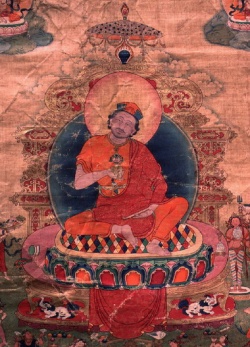Difference between revisions of "Katok Tsewang Norbu"
| (5 intermediate revisions by 2 users not shown) | |||
| Line 1: | Line 1: | ||
[[File:Rigdzin_tsewang_norbu.jpg|thumb|250px|]] | [[File:Rigdzin_tsewang_norbu.jpg|thumb|250px|]] | ||
| − | |||
| − | |||
| − | After the suppression of the [[Jonang]] school and its texts and the texts of Sakya Chokden by the [[5th Dalai Lama]] in the 17th century, various Shentong views were propagated mainly by [[Karma Kagyu]] and [[Nyingma]] [[lama]]s. In particular, the 8th [[Tai Situ Rinpoche]] (Situ Paṇchen Chökyi Jungné (si tu paṇ chen chos kyi 'byung gnas) (1700–1774)) and Katok Tsewang Norbu (kaḥ thog tshe dbang nor bu) (1698–1755), close colleagues and Karma Kagyu and Nyingma lamas respectively, were very instrumental in reviving Shentong among their sects. He influenced his student [[Situ Panchen]] in the study, who accordingly spread his beliefs; according to 2003's The Budda from Dolpo, " in the end it would be Situ more than anyone who would create the environment for the widespread acceptance of the Zhentong theories in the next century. This revival was continued by [[Jamgon Kongtrul|Jamgon Kongtrul Lodro Thaye]], a 19th century [[Rime]] ('non-partisan') scholar and forceful partisan of Shentong, and were also advanced recently by the eminent [[Kagyu]] | + | |
| + | '[[Katok Tsewang Norbu]]' ([[Wylie]]: [[kaḥ thog tshe dbang nor bu]]) (1698–1755) was a [[Nyingmapa]] (follower of the oldest of the four major schools of [[Tibetan Buddhism]]) who championed the [[view]] of '[[extrinsic emptiness]]' or [[Zhentong]] ([[Wylie]]: [[gzhen-stong]]) which he propagated amongst his [[tradition]]. | ||
| + | |||
| + | His seat was the [[Katok Monastery]] of [[Tibet]]. | ||
| + | |||
| + | |||
| + | ==Contextualising [[Zhentong]]== | ||
| + | |||
| + | |||
| + | After the suppression of the [[Jonang]] school and its texts and the texts of [[Sakya Chokden]] by the [[5th Dalai Lama]] in the 17th century, various [[Shentong]] [[views]] were propagated mainly by [[Karma Kagyu]] and [[Nyingma]] [[lama]]s. | ||
| + | |||
| + | In particular, the 8th [[Tai Situ Rinpoche]] ([[Situ Paṇchen Chökyi Jungné]] ([[si tu paṇ chen chos kyi 'byung gnas]]) (1700–1774)) and [[Katok Tsewang Norbu]] ([[kaḥ thog tshe dbang nor bu]]) (1698–1755), close colleagues and [[Karma Kagyu]] and [[Nyingma lamas]] respectively, were very instrumental in reviving [[Shentong]] among their sects. | ||
| + | |||
| + | He influenced his student [[Situ Panchen]] in the study, who accordingly spread his [[beliefs]]; according to 2003's The [[Budda from Dolpo]], " in the end it would be Situ more than anyone who would create the environment for the widespread [[acceptance]] of the [[Zhentong]] theories in the next century. | ||
| + | |||
| + | This revival was continued by [[Jamgon Kongtrul|Jamgon Kongtrul Lodro Thaye]], a 19th century [[Rime]] ('non-partisan') [[scholar]] and forceful {{Wiki|partisan}} of [[Shentong]], and were also advanced recently by the {{Wiki|eminent}} [[Kagyu Lamas]] [[Kalu Rinpoche]] and [[Khenpo Tsultrim Gyamtso Rinpoche]]. | ||
| Line 11: | Line 24: | ||
[[Category:Tibetan Buddhist Teachers]] | [[Category:Tibetan Buddhist Teachers]] | ||
| − | + | ||
__NOTOC__ | __NOTOC__ | ||
| − | [[Category:Nyingma | + | [[Category:Nyingma Masters]] |
[[Category:Buddhist Terms]] | [[Category:Buddhist Terms]] | ||
| + | [[Category:Kathok]] | ||
Latest revision as of 17:03, 29 October 2015
'Katok Tsewang Norbu' (Wylie: kaḥ thog tshe dbang nor bu) (1698–1755) was a Nyingmapa (follower of the oldest of the four major schools of Tibetan Buddhism) who championed the view of 'extrinsic emptiness' or Zhentong (Wylie: gzhen-stong) which he propagated amongst his tradition.
His seat was the Katok Monastery of Tibet.
Contextualising Zhentong
After the suppression of the Jonang school and its texts and the texts of Sakya Chokden by the 5th Dalai Lama in the 17th century, various Shentong views were propagated mainly by Karma Kagyu and Nyingma lamas.
In particular, the 8th Tai Situ Rinpoche (Situ Paṇchen Chökyi Jungné (si tu paṇ chen chos kyi 'byung gnas) (1700–1774)) and Katok Tsewang Norbu (kaḥ thog tshe dbang nor bu) (1698–1755), close colleagues and Karma Kagyu and Nyingma lamas respectively, were very instrumental in reviving Shentong among their sects.
He influenced his student Situ Panchen in the study, who accordingly spread his beliefs; according to 2003's The Budda from Dolpo, " in the end it would be Situ more than anyone who would create the environment for the widespread acceptance of the Zhentong theories in the next century.
This revival was continued by Jamgon Kongtrul Lodro Thaye, a 19th century Rime ('non-partisan') scholar and forceful partisan of Shentong, and were also advanced recently by the eminent Kagyu Lamas Kalu Rinpoche and Khenpo Tsultrim Gyamtso Rinpoche.
